Nature’s Path’s move “protests” betrayals by the Organic Trade Association
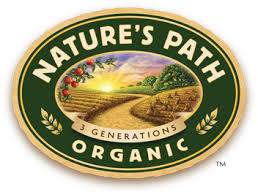 The widely respected and leading organic breakfast foods manufacturer, Nature’s Path, announced the company’s resignation from membership in the Organic Trade Association (OTA), a prominent and increasingly controversial lobby group representing business interest in the industry. The announcement came in a letter to the organic community last week.
The widely respected and leading organic breakfast foods manufacturer, Nature’s Path, announced the company’s resignation from membership in the Organic Trade Association (OTA), a prominent and increasingly controversial lobby group representing business interest in the industry. The announcement came in a letter to the organic community last week.
The OTA has been increasingly criticized for representing the interests of corporate agribusiness at the expense of core values held by farmers, consumers, and founding business leaders.
 |
Nature’s Path |
“Our departure from the OTA is an act of protest to raise awareness of our concerns that the important role organic plays in support of the health of consumers and our planet is being compromised,” said Arran Stephens, a company founder and co-CEO.
Stephens cited concerns about the OTA’s role in brokering a GMO labeling “compromise” in Congress that resulted in federal law preempting states, like Vermont which had legislation ready to go into effect, from passing regulations mandating the labeling of food produced through genetic engineering.
Nature’s Path is not the first iconic organic manufacturer and marketer to leave the OTA in protest. Dr. Bronner’s withdrew from the OTA after the GMO labeling debacle in Congress citing “a general drift away from the core principles that drive the organic movement.”
The Cornucopia Institute, a nonprofit which acts as a governmental and corporate watchdog in the organic industry, has long been critical of the OTA. Like Nature’s Path, they credited the OTA as the most powerful lobby group pushing the USDA National Organic Program’s (NOP) controversial approval of hydroponic production of certified fruits and vegetables.
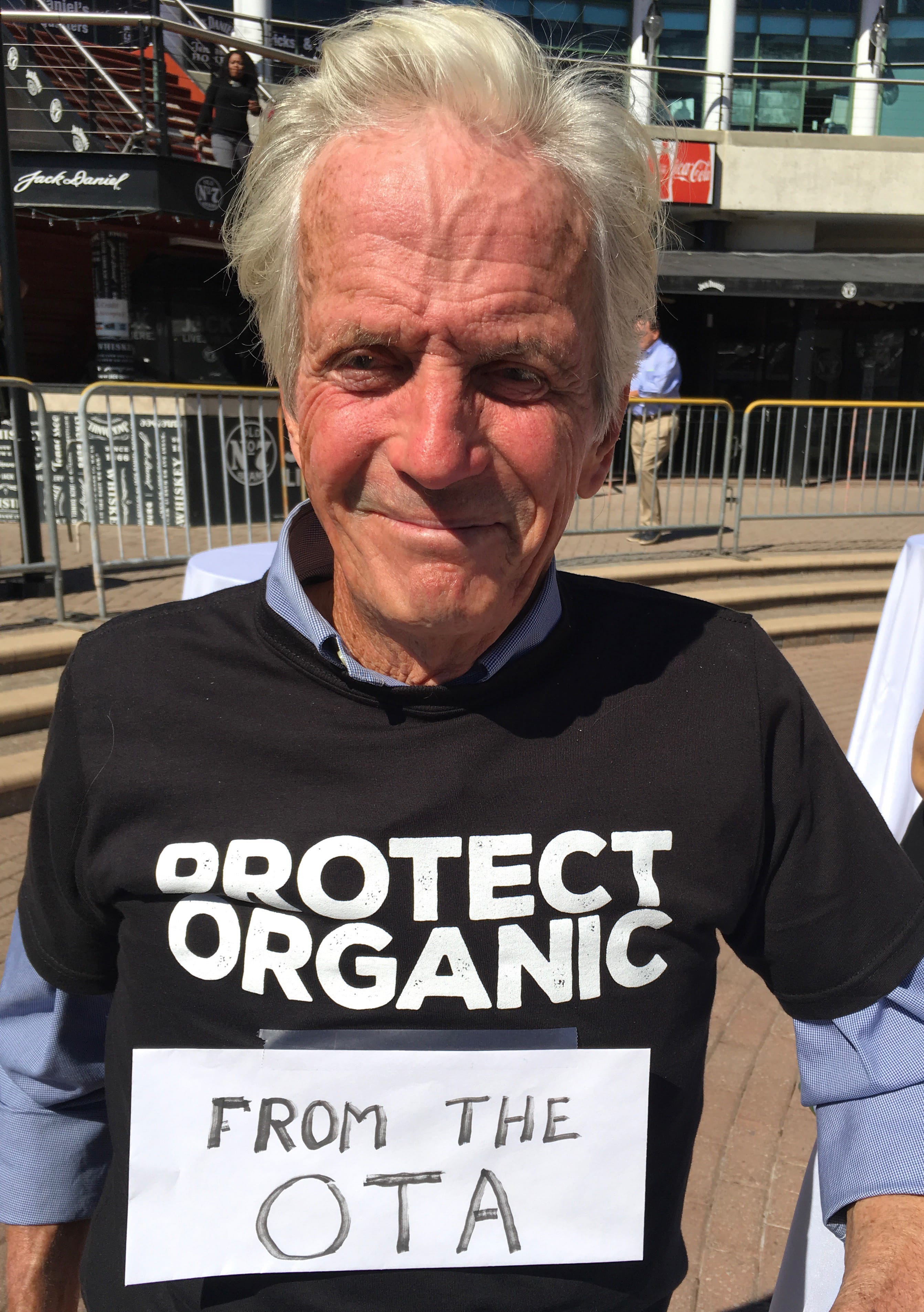 |
Jacksonville, Florida NOSB meeting to fight “organic” hydroponics, one of organic farming’s most famous and eloquent spokespersons, Eliot Coleman, modified his t-shirt to state “Protect Organic – from the OTA.” |
“It did not matter to OTA lobbyists that the requirement for good soil stewardship, in both the enabling legislation and the regulations, was a prerequisite for organic certification,” said Mark A. Kastel, Senior Farm Policy Analyst at the Wisconsin-based Cornucopia Institute. “When there are billions of dollars at stake, time and time again, the OTA has sided with conventional agribusiness interested in liberalizing the working definition of organics.”
Cornucopia continues to do the groundwork to challenge the legality of the USDA’s history of allowing hydroponics, plants grown in liquid fertilizers, despite the clear requirement in the Organic Foods Production Act that soil fertility, the historic basis for organic plant nutrition, is “maintained or improved.”
In addition to GMOs and hydroponics, the OTA has been criticized for standing with organic “factory farms,” some dairies milking as many as 15,000 cows in feedlot conditions, in spite of mounting evidence of serious improprieties.
“Although it took place in the year I was born, I recall the infamous take-away during the McCarthy hearings, when the lawyer for the U.S. Army asked the senator, in essence, ‘Have you no shame?’” said Kastel. “That quote came to mind when, 10 years ago, USDA investigators found Aurora Dairy in ‘willful’ violations of federal law, including illegally bringing in conventional cattle and confining dairy cows instead of grazing. The very next press release issued by the OTA, on an unrelated issue, used a spokesman for Aurora to represent the association. Shame.”
Earlier this year the OTA was also rebuked by the USDA for falsely purporting that the organic industry universally supported their scheme for a promotional/research “checkoff” (a tax on farmers and businesses). Federal regulators found far from consensus support for the proposal.
“In a political environment where euphemisms for ‘lying’ are being used in covering Washington, I won’t pull any punches,” added Kastel. “On one of my visits to Capitol Hill, I was told, point blank, by congressional staffers that OTA lobbyists had told them ‘everyone in the organic industry supported their check off.’ That couldn’t have been further from the truth.”
A coalition of farm groups, including OFARM, The Northeast Organic Dairy Producers Alliance, the Organic Seed Growers and Trade Association, the Western Organic Dairy Producers Alliance, and several state chapters of the Northeast Organic Farming Association, along with Cornucopia, generated thousands of public comments opposing the OTA proposal before the USDA rejection.
The OTA has long been accused of “having their tentacles” reaching into the management at the National Organic Program and what should be the independent advisory panel set up by Congress, the National Organic Standards Board (NOSB).
In one of the more egregious examples of their influence, before resigning under an ethical cloud, the NOP’s former director, Miles McEvoy, quietly approved hydroponic production in organics, even though the law clearly required soil and no regulatory language existed to regulate soil-less production.
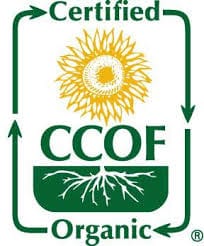 The primary certifier of hydroponic operations is CCOF, the country’s largest USDA accredited certifying agent. McEvoy’s decision benefited their bottom line. After leaving the USDA McEvoy went through the proverbial “revolving door” in Washington and is now working as a consultant for CCOF, an organization he was previously responsible for overseeing.
The primary certifier of hydroponic operations is CCOF, the country’s largest USDA accredited certifying agent. McEvoy’s decision benefited their bottom line. After leaving the USDA McEvoy went through the proverbial “revolving door” in Washington and is now working as a consultant for CCOF, an organization he was previously responsible for overseeing.
One of CCOF’s hydroponic clients is the giant berry producer, Driscoll’s. During the NOSB debate over the propriety of allowing hydroponics in organic production, the discussion was led by Driscoll’s employee, Carmela Beck. She sat in a seat on the board designated by Congress for someone who “owns or operates an organic farm” (Driscoll’s does not grow any berries but rather contracts with independent growers).
As a reward for her efforts, the lobby group subsequently designated her the Organic Trade Association member of the year.
Dave Chapman, greenhouse grower from Vermont, responded to Nature’s Path withdrawal from the OTA by saying, “It is critical that the large processors who care about organic stand up and join the farmers and eaters who are fighting for real organic. This is not just a matter of ‘protecting the brand’ but also of protecting the meaning of organic. Without that meaning, the brand isn’t worth protecting.”
MORE:
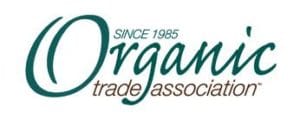 The Organic Trade Association started out as the Organic Foods Production Association of North America (OFPANA) in the 1980s.
The Organic Trade Association started out as the Organic Foods Production Association of North America (OFPANA) in the 1980s.
“In the beginning this organization was truly an umbrella group representing farmers and the founding entrepreneurs in this industry,” The Cornucopia Institute’s Kastel said. “As most of the major brands in the organic industry were acquired by large corporate agribusinesses, the OTA morphed into just another greedy, self-serving, Washington-based lobby group.”
Many rank-and-file members of the organic farming community have begun to challenge the affiliation their organizations have with the OTA. Farmer-owners of the $1 billion+ enterprise known as Organic Valley have questioned the hundreds of thousands of dollars of their equity that have been invested in the OTA in recent years. This is in addition to travel expenses and salaries of numerous Organic Valley management members who have helped lead the OTA in recent years. During the GMO labeling dustup in Congress, the OTA Board President was Organic Valley’s chief legal counsel.
The current “certifier seat” on the NOSB is held by the executive director of Pennsylvania Certified Organic (PCO). She was one of the OTA’s chief marketers, conducting talks around the country, trying to sell the farming community on the checkoff scheme. Irreconcilable differences over that controversial issue, and other concerns, led to a mass resignation within PCO’s board of directors.
“Although certifiers and material review organizations [MRO: the independent groups that advise certifiers in terms of the acceptability of using non-organic inputs] should be absolutely independent, most of the major players are active OTA members,” stated Kastel.
CCOF has been listed as one of the biggest donors to the OTA and is active at the lobby group’s public events. It has long been the position of The Cornucopia Institute that certifiers should be truly independent and not lobby on behalf of their clients.
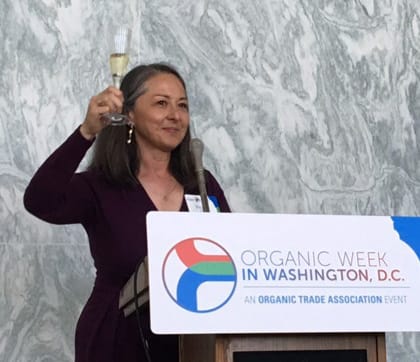 |
The current head of the leading MRO, the Organic Materials Review Institute (OMRI), is a former CEO at CCOF. OMRI, with a revenue stream derived from corporations that either manufacturer or use synthetic and non-organic ingredients in their products, is also an active OTA member. OMRI CEO Peggy Miars recently attended the OTA’s lobby-day on Capitol Hill. The organizations are not at all shy about these incestuous relationships. The OTA released a photo of Miars toasting OTA members at their Washington confab this spring. It should also be noted that she has recently been elected president of the international organic trade group known as IFOAM.

